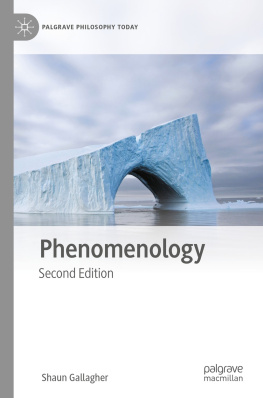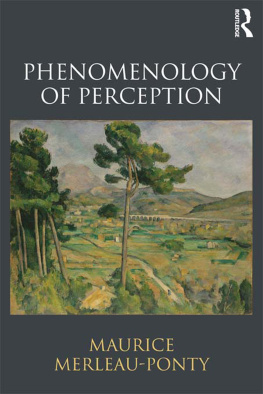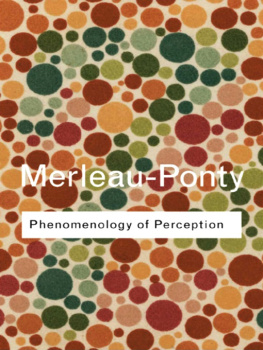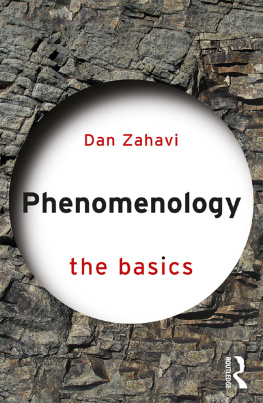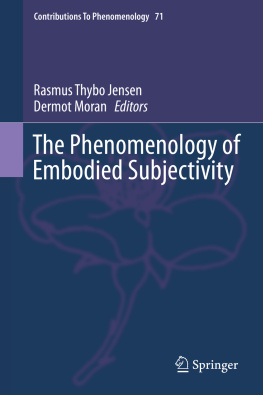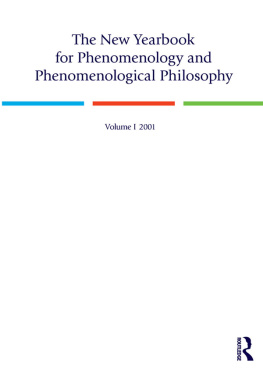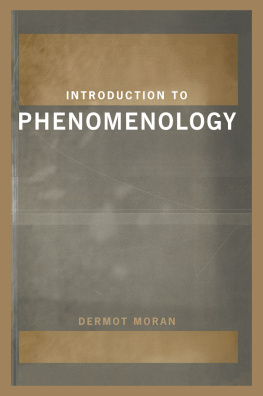
For Andrea and Emanuela
Copyright Stephan Kufer and Anthony Chemero 2015
The right of Stephan Kufer and Anthony Chemero to be identified as Authors of this Work has been asserted in accordance with the UK Copyright, Designs and Patents Act 1988.
First published in 2015 by Polity Press
Polity Press
65 Bridge Street
Cambridge CB2 1UR, UK
Polity Press
350 Main Street
Malden, MA 02148, USA
All rights reserved. Except for the quotation of short passages for the purpose of criticism and review, no part of this publication may be reproduced, stored in a retrieval system, or transmitted, in any form or by any means, electronic, mechanical, photocopying, recording or otherwise, without the prior permission of the publisher.
ISBN-13: 978-0-7456-5147-7 (hardback)
ISBN-13: 978-0-7456-5148-4 (paperback)
ISBN-13: 978-0-7456-9494-8 (epub)
ISBN-13: 978-0-7456-9401-6 (mobi)
A catalogue record for this book is available from the British Library.
Library of Congress Cataloging-in-Publication Data
Kufer, Stephan.
Phenomenology : an introduction / Stephan Kufer, Anthony Chemero.
pages cm
Includes bibliographical references and index.
ISBN 978-0-7456-5147-7 (hardcover : alk. paper) ISBN 0-7456-5147-X (hardcover : alk. paper) ISBN 978-0-7456-5148-4 (pbk. : alk. paper) ISBN 0-7456-5148-8 (pbk. : alk. paper) 1. Phenomenology. I. Chemero, Anthony, 1969- II. Title.
B829.5.K38 2015
142.7dc23
2014044491
The publisher has used its best endeavors to ensure that the URLs for external websites referred to in this book are correct and active at the time of going to press. However, the publisher has no responsibility for the websites and can make no guarantee that a site will remain live or that the content is or will remain appropriate.
Every effort has been made to trace all copyright holders, but if any have been inadvertently overlooked the publisher will be pleased to include any necessary credits in any subsequent reprint or edition.
For further information on Polity, visit our website: politybooks.com
Acknowledgments
We have been fortunate to study and discuss this material with many teachers and colleagues who have shaped our understanding of phenomenology. In particular we wish to thank Bert Dreyfus, Dagfinn Fllesdal, Bill Mace, Mike Turvey, and Fred Owens. We are also grateful to audiences at the American Society for Existential Phenomenology, Illinois State University, the International Society for Ecological Psychology, the International Society for Phenomenological Studies, Nicholas Copernicus University, the Norwegian University of Science and Technology, San Francisco State University, the Society for Philosophy and Psychology, the University of Antwerp, and the University of California-Merced, and especially to Mike Anderson, Chris Baber, Louise Barrett, Bill Blattner, Taylor Carman, Dave Cerbone, Steve Croker, Steve Crowell, Rick Dale, Ola Derra, Dobri Dotov, Catarina Dutilh-Novaes, Beatrice Han-Pile, Harry Heft, Dan Hutto, Jenann Ismael, Scott Jordan, Chris Kello, Sean Kelly, David Kirsh, Julian Kiverstein, Jonathan Knowles, Tomasz Komendzinski, Mariusz Kozak, Wayne Martin, Samantha Matherne, Teenie Matlock, Jakub Matyja, Richard Menary, Marcin Mikowski, Ronny Myhre, Erik Myin, Lin Nie, Jacek Olender, Kevin O'Regan, Mark Okrent, Isabelle Peschard, Marek Pokropski, Mike Richardson, Erik Rietveld, Etienne Roesch, Komarine Romdenh-Romluc, Joe Rouse, Charles Siewert, Michael Silberstein, Michael Spivey, Pierre Steiner, John Sutton, Iain Thompson, Bas van Fraassen, Witold Wachowski, Jeff Wagman, Mike Wheeler, Rob Withagen, Mark Wrathall, Jeff Yoshimi, Julian Young, and Corinne Zimmerman.
We taught seminars on this material at Franklin and Marshall College and at the University of Cincinnati. We are grateful to students in those seminars, and to Jenefer Robinson, for helping us to present the material more clearly. Thanks also to Guilherme Sanches de Oliveira for help with proofreading and the index.
Large portions of this book were written during research leaves from Franklin and Marshall College and the University of Cincinnati. We are grateful to these institutions for their support.
Most of all, we are grateful for the love and support of our families.
Introduction
Phenomenology is a loosely grouped philosophical tradition that began with Edmund Husserl in the 1890s and is still practiced today, though some of its current instantiations no longer use the name. The tradition is old enough to have a history, and it includes claims that seem odd, quaint, or outdated. And yet it is recent enough that even the work of its founders is alive with ideas that still challenge us and hold great promise. Arguably philosophers are only now beginning to fully appreciate the core insights of phenomenology, as we learn to construct rigorous analyses of perception and cognition in a phenomenological framework.
This book covers what we believe an interested reader ought to know about phenomenology, its history, its most important authors and works, and its influence on branches of current philosophy, psychology, and cognitive science. We discuss the history of phenomenology through the work of Husserl, Heidegger, Merleau-Ponty, and Sartre, their arguments against scientific psychology, and their critical examination of Gestalt psychology. And we discuss contemporary developments in ecological psychology, critiques of cognitivist approaches to artificial intelligence, and embodied cognitive science. This mix of topics and level of detail make this a good textbook for undergraduates studying philosophy, psychology, or cognitive science, and a good starting point for graduate students and academics who are new to phenomenology.
What you will not find in this book
One prominent concern of phenomenology has been to provide an account of the structures that make a shared, objective world intelligible. This account recognizes that bodies and skills are fundamental for this intelligibility. We consider this to be the most important and most productive strain of phenomenology, and this book is intended to give a clear introduction to it and its implications for contemporary work on perception, action, and cognition.
Another strain of phenomenology, which we can only explore briefly in this book, gives a description of subjective experiences, especially of experiences that are unusual and hard to explain. So, for example, phenomenology might provide an analysis of what it is like to experience religious faith, overpowering sentiments such as love or anxiety, aesthetic highs, inescapable ambiguities and paradoxes, and so forth. This is an important task, and quite often it intermingles with the first task. In Heidegger's work, in particular, an understanding of anxiety and contingency belongs with his explanation of the intelligibility of the world. In general, Husserl, Heidegger, Merleau-Ponty, and Sartre were broad and innovative thinkers and their writings touch on art, religion, politics, aesthetics, and morality. Existentialism is largely an offshoot of phenomenology, and so is much critical theory in literary studies. Consequently, phenomenology has influenced many different fields; too many to cover in a single book. Browse the faculty pages of a university website, and you may find a large number of people in literature departments, film and theater studies, theology, art, and political science who identify their work as phenomenology. We do not deny the importance of this phenomenology in these various fields. But a single book cannot presume to cover all this material. Our choice of topics and authors is motivated primarily by our conviction that contemporary work on embodied cognitive science is a particularly clear and relevant continuation of the most central concerns that Husserl, Heidegger, and Merleau-Ponty were pursuing.
Next page

